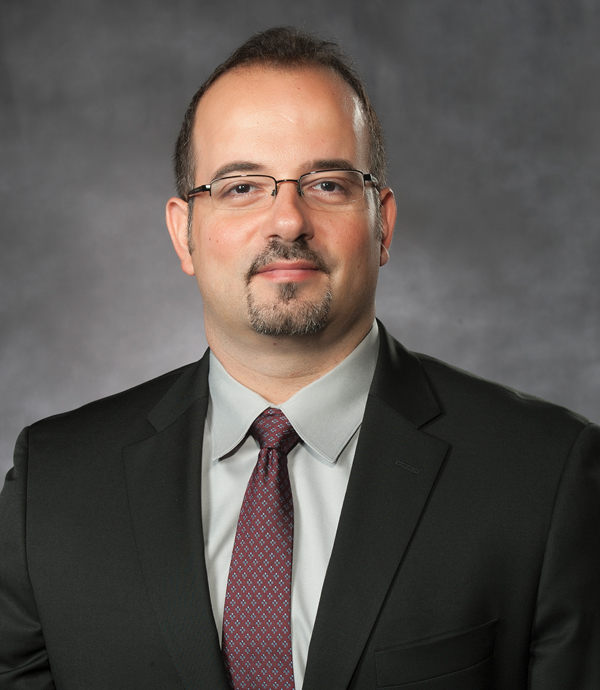Conference Brings Clarity to Heart Failure
Dr. Fadi Salloum and his colleague from the Louisiana State University–New Orleans School of Medicine, Dr. David Lefer, co-chaired a one-day conference to discuss a hot topic in the scientific community: heart failure with preserved ejection fraction—HFpEF, for short.
 Dr. Fadi Salloum, Natalie N. and John R. Congdon Sr. Endowed Chair
Dr. Fadi Salloum, Natalie N. and John R. Congdon Sr. Endowed Chair
Ninety clinicians, scientists and Pharma and biotechnology representatives attended the 2019 Inaugural HFpEF Summit, which took place at the Bourbon Orleans Hotel in New Orleans. Salloum and Lefer presented the opening and closing remarks, while 12 other leading scientists and clinical experts in the field gave presentations throughout the day. They included Dr. David Kass, Johns Hopkins University School of Medicine; Dr. Gregory Lewis, Massachusetts General Hospital; Dr. Sanjiv Shah, Northwestern Memorial Hospital; and Dr. Joseph Hill, University of Texas Southwestern.
The goal of the event was “to develop a consensus on the key research questions and clinical issues related to the discovery and development of HFpEF therapeutics,” said Salloum, a scientist who holds the Natalie N. and John R. Congdon Sr. Endowed Chair at Pauley. “To date, there are no FDA-approved therapies to treat patients with this complex syndrome.”
For many years, the gold standard for evaluating heart failure was ejection fraction (EF), a measure of contractility that reflects the amount of blood pumped out of the heart by the left ventricle. Those with low EF were considered to have heart failure; those with normal percentages were not, said Salloum.
He explained that more recent research shows a new category of heart failure patients: those who have ejection fractions within a normal range but suffer an impaired relaxation of the heart. Relaxation, an important part of the cardiac cycle, follows the contraction of the heart. When it’s impaired, the chambers do not fill properly.
“Hef-pef,” as scientists and clinicians call it, has become something of a buzzword recently. “It’s an interesting syndrome that everyone wants to study, but we still have to be careful. We can’t just call anything and everything with normal ejection fraction HFpEF,” said Salloum.
The goal of event was “to develop a consensus on the key research questions and clinical issues related to the discovery and development of HFpEF therapeutics,” said Salloum.
According to Lefer, who directs LSU’s Cardiovascular Center of Excellence, “the inaugural HFpEF Summit was a tremendous success and brought together the world leaders in HFpEF research and patient care. We very much look forward to our continued collaboration with Dr. Fadi Salloum and the Pauley Heart Center and continue hosting this exciting event. We have already begun planning for HFpEF Summit 2021.”
Dr. Salloum Exploring Cardioprotective Compounds through SBIR, RO1 Grants
Dr. Fadi Salloum and Dr. Aninditas Das, in collaboration with San Diego-based NovoMedix, received a $375,000 Small Business Innovation Research grant from the NIH in July to conduct cardio-oncology research on an antifibrotic compound. Building on past research with cancer cells, the pair will now explore the same compound for its cardioprotective effects in a mouse model of triple negative breast cancer undergoing chemotherapy. Salloum will serve as PI and Das the Co-PI for the phase 1 study.
“Cancer drugs are known to cause cardiac fibrosis—scarring of the heart. The problem is that scar tissue doesn’t contract, so this means that the pumping ability of the heart becomes compromised over time,” said Salloum.
Salloum has also started research on the benefits of relaxin, a pregnancy hormone recently recognized for its potential cardiovascular benefits. He received an RO1 grant (his second to date) from the NIH, worth $1.6 million over four years. The study will focus on testing the protective effects of relaxin in the context of heart attack and its related complications, ultimately leading to heart failure, and will run from July 1, 2018, to June 30, 2022.
Relaxin is present in both males and females, but its levels rise during pregnancy. “That’s what protects a woman from the burden of the excess fluids that build up in her body, which could otherwise damage the kidneys and the heart. Having this hormone is what prevents most pregnant women from developing heart failure.”
Back to Autumn-2019

